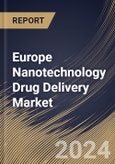In the realm of neurological drug delivery, nanotechnology has shown promise in treating conditions such as Alzheimer's disease, Parkinson's disease, and brain tumors. Nanocarriers, including polymeric nanoparticles and lipid-based nanocarriers, have been investigated for their potential to enhance drug delivery to the brain and improve therapeutic outcomes. Furthermore, the development of nanotheranostics-nanoparticles that combine therapeutic and diagnostic functions - holds the potential for real-time monitoring and personalized treatment strategies in neurological disorders.
Additionally, nanotechnology is crucial in addressing challenges associated with infectious diseases, offering innovative solutions for drug delivery and diagnostics. Nanoparticles can enhance the delivery of antimicrobial agents, antiviral drugs, and vaccines. In the context of antibiotic resistance, nanocarriers can improve the efficacy of existing antibiotics and potentially overcome resistance mechanisms. The development of nano vaccines represents a notable advancement in infectious disease applications of nanotechnology. Nanoparticles can serve as effective carriers for antigens, promoting targeted immune responses and enhancing vaccine efficacy. This approach holds promise for addressing global health challenges, including the ongoing quest for effective vaccination strategies against emerging infectious diseases.
Cancer is a major health concern globally, including within the European Union. The UK has established itself as a hub for research and innovation, particularly in the medical and pharmaceutical sectors. With a growing emphasis on medical technology, research institutions, and companies are likely to invest in nanotechnology for drug delivery systems. This could lead to the development of advanced and efficient drug delivery methods. As per the data provided in 2023 by the International Trade Administration, the UK medical technology sector generates an annual turnover of approximately $33 billion, it has a strong foundation of mostly small to medium-sized companies around the country. Thus, rising cancer cases and the medical technology sector in Europe will boost the demand for these drug delivery in the coming years.
The Germany market dominated the Europe Nanotechnology Drug Delivery Market, by Country in 2022, and would continue to be a dominant market till 2030; thereby, achieving a market value of $9,419.9 Million by 2030. The UK market is exhibiting a CAGR of 7.5% during (2023 - 2030). Additionally, The France market would experience a CAGR of 9.3% during (2023 - 2030).
Based on Formulation, the market is segmented into Polymer-Based Nanomedicine, Lipid-Based Nanomedicine, Nanocrystals, and Others. Based on Application, the market is segmented into Oncology & Hematology, Infectious Diseases, Orthopedics, Neurology, Immunology, Urology, and Others. Based on countries, the market is segmented into Germany, UK, France, Russia, Spain, Italy, and Rest of Europe.
List of Key Companies Profiled
- AbbVie, Inc.
- Pfizer Inc.
- Johnson & Johnson (Johnson & Johnson Services, Inc.)
- Novartis AG
- Bristol-Myers Squibb Company
- AstraZeneca PLC
- Amgen, Inc.
- Merck KGaA
- Teva Pharmaceutical Industries Ltd.
- Sanofi S.A.
Market Report Segmentation
By Formulation- Polymer-Based Nanomedicine
- Lipid-Based Nanomedicine
- Nanocrystals
- Others
- Oncology & Hematology
- Infectious Diseases
- Orthopedics
- Neurology
- Immunology
- Urology
- Others
- Germany
- UK
- France
- Russia
- Spain
- Italy
- Rest of Europe
Table of Contents
Companies Mentioned
- AbbVie, Inc.
- Pfizer Inc.
- Johnson & Johnson (Johnson & Johnson Services, Inc.)
- Novartis AG
- Bristol-Myers Squibb Company
- AstraZeneca PLC
- Amgen, Inc.
- Merck KGaA
- Teva Pharmaceutical Industries Ltd.
- Sanofi S.A.








